Updated 1 year ago
A full review of the EcoFlow DELTA Pro Ultra home battery
Written by
Jamie Smith
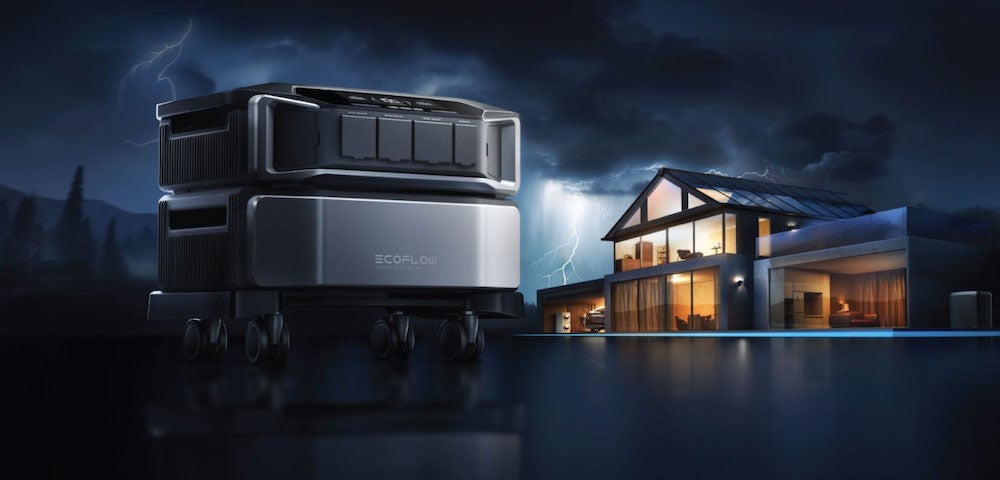
Find out what solar panels cost in your area
EcoFlow, a company known for its portable solar generators, has unveiled a whole-home battery backup system for 2024. Called the DELTA Pro Ultra, this stackable battery and inverter duo was designed to be the ultimate power solution for whole-home backup during extended power outages and for daily use.
Is this battery worth the price tag? Read on for our full expert review of the DELTA Pro Ultra by EcoFlow.
EcoFlow DELTA Pro Ultra: The review
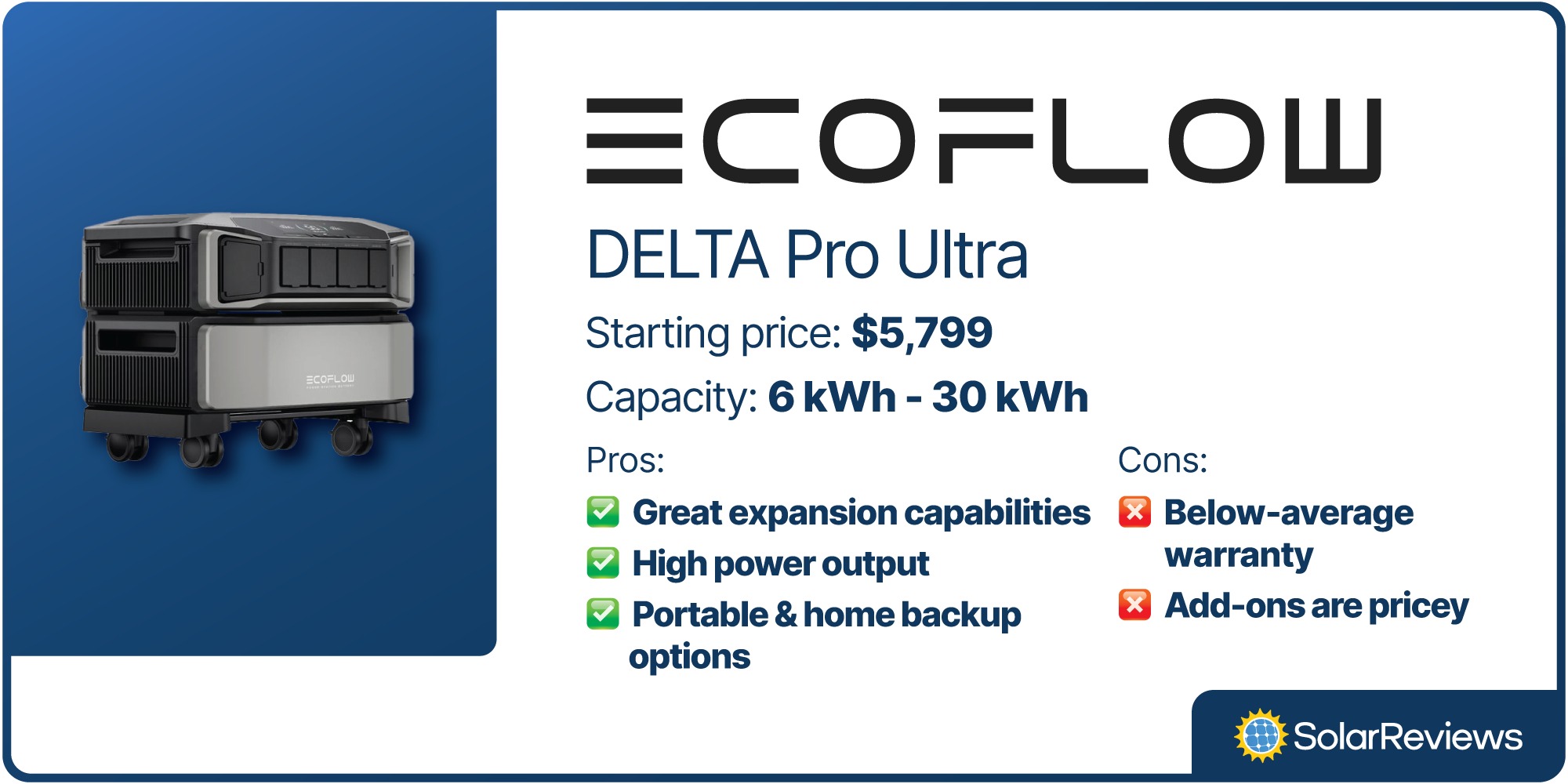
The EcoFlow DELTA Pro Ultra has a starting price of $5,799 and a capacity ranging from 6 kWh - 30 kWh.
Overall, the EcoFlow DELTA Pro Ultra is a solid home battery choice for those looking for storage that comes at a reasonable price, especially for all of the features it has. There are many configurations of the DPU, but our experts recommend installing the battery and inverter duo kit and pair it with the EcoFlow Smart Home Panel 2 to get the most out of your money.
What’s good:
The EcoFlow DPU is one of the most versatile battery options on the market. Not only can it serve as a home battery, but it can be disconnected and used as a portable one as well. So, if you need to take it on the go or you need some extra power in your house or yard with very little hassle.
It’s also easy to expand, thanks to the DPU’s modular design. Starting at 6 kilowatt-hours (kWh), a single unit can be expanded to 30 kWh. Up to three EcoFlow Delta Pro Ultra units can be installed together for a whopping 90 kWh of storage capacity. That’s probably not necessary for most homeowners, but it may come in handy for off-grid cabins!
The Delta Pro Ultra comes at a little bit of a higher price compared to other home batteries, coming in at $5,799 before installation for the smallest unit. But, it does also come with the added capability of becoming a portable system, so it’s not a shock that it costs a little bit more money. The battery system does qualify for the 30% clean energy tax credit to cut down on costs, and EcoFlow offers an interest-free payment option, which is great considering how high interest rates can be for solar-plus-storage loans.
What’s not-so-good:
Most batteries on the market today come with a warranty of 10 years or more. EcoFlow comes up short with only five years of coverage. There’s also no clear indication as to whether or not a performance guarantee comes with it.
Also, the battery has the best capabilities when paired with EcoFlow’s Smart Home Panel 2, which is an added expense. This leaves you with having to choose between spending an extra $1,400 for the Smart Home Panel or installing the option that might not save you as much on your electricity bills.
The installation process for the battery also isn’t abundantly clear. Most home solar batteries are purchased through and installed by the solar installer, but the DPU can be ordered directly by the consumer online. You’d then have to find an electrician or solar company willing to just do the installation, which may be difficult, especially if you already have grid-tied solar panels on your roof.
How does the DELTA Pro Ultra battery work?
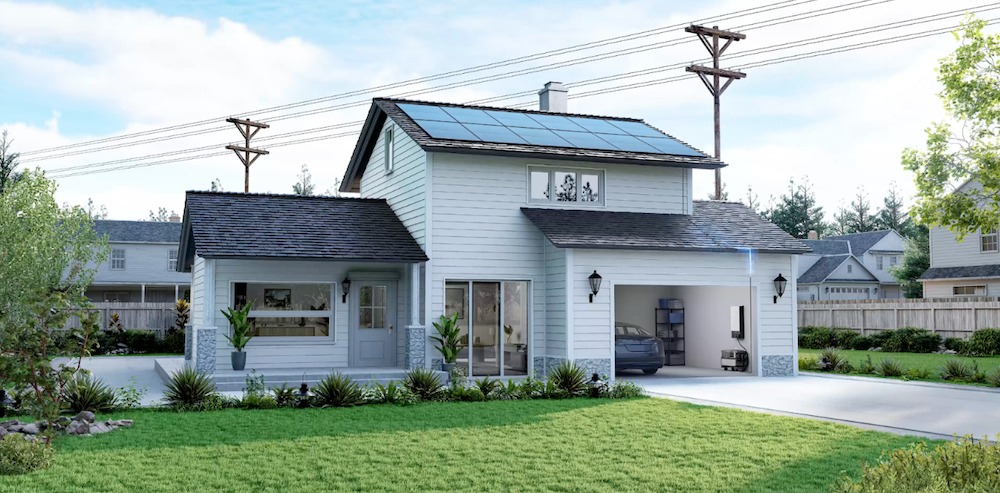
The Delta Pro Ultra is a home battery that definitely packs a punch. Each unit comes with an inverter and one battery pack and must be paired with either a manual transfer switch or the EcoFlow Smart Home 2 panel to connect to your home.
The base model comes with 6 kWh of capacity that can be recharged by 5.6 kW of solar input from the grid or via a gas-powered generator. With three DPU units having a solar input of 16.8 kW, you have the potential to connect up to forty-two 400-watt solar panels. The DPU system can be connected to your home via the manual transfer switch or the EcoFlow Smart Home 2 panel to run your most important electrical loads.
If you need to take the EcoFlow DPU on the go, the plug-and-play design makes it easy to disconnect the unit from your home and take it wherever you need power. You can connect just about any device to the EcoFlow Delta Pro Ultra, as it comes with USB-C and USB-A to AC outlets and even a DC output port.
Home backup
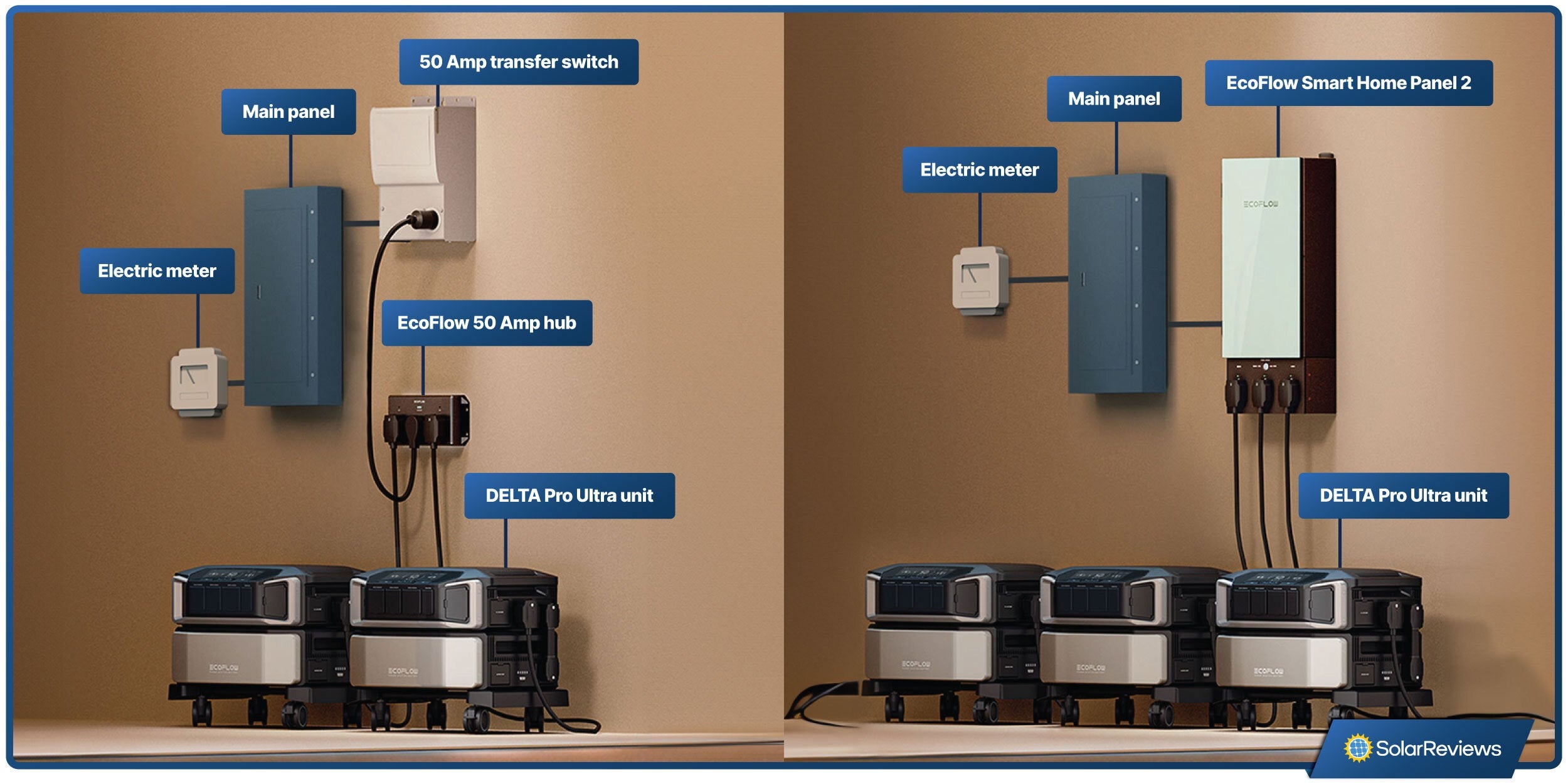
There are two ways of connecting this battery to your home. The simplest and most affordable way is by plugging the battery into a manual transfer switch to power your critical circuits. If you want to use more than one DPU unit, you’ll have to install EcoFlow’s 50 Amp Hub in addition to the manual transfer switch.
The second way is pairing your set-up with an EcoFlow Smart Home Panel 2. When paired with the panel, you have control over how and when your battery is charging and discharging and how much backup power you reserve through EcoFlow’s app. One key feature is EcoFlow’s time of use mode that allows you to charge your battery when electricity is cheap and discharge it when it’s most expensive, resulting in lower electricity bills.
Disclaimer: You only have the ability to expand to the full 90 kWh capacity by connecting the units to a Smart Home Panel 2, so the other methods will limit your capacity to a maximum of 60 kWh.
On the go
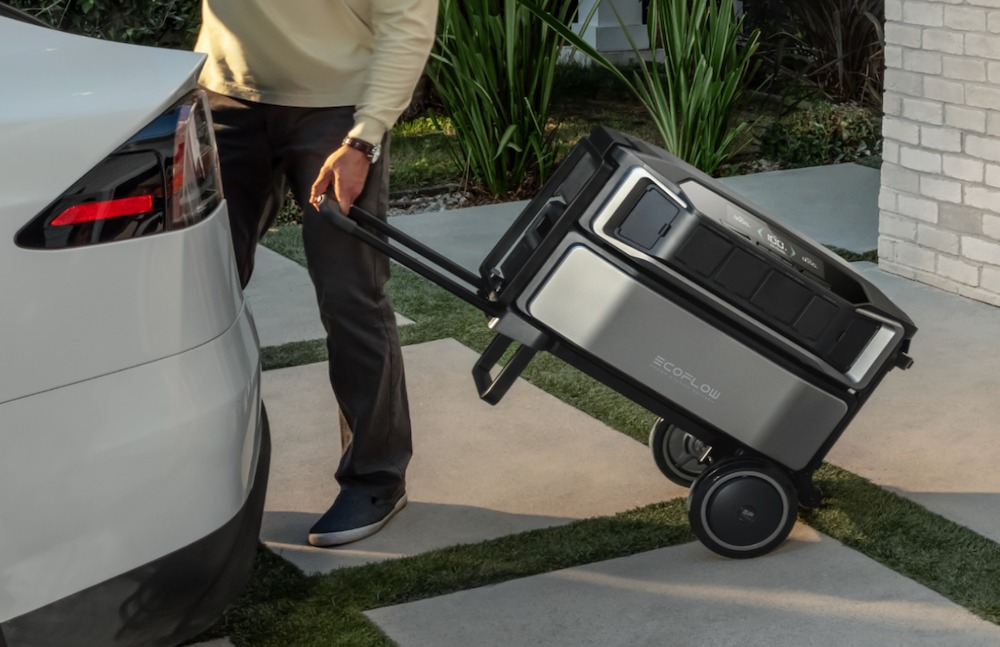
You can use the DELTA Pro Ultra entirely on its own, too. With a trolley available to purchase, you can easily take this battery with you anywhere. Just keep in mind that the trolley only fits one inverter and one battery.
This can come in handy for vacations or camping trips, as the DELTA Pro Ultra can power essential appliances and electric devices through its multiple power ports and even has an RV hookup.
Can you install the EcoFlow DELTA Pro Ultra yourself?
You could do a DIY installation of the EcoFlow DELTA Pro Ultra, but it can get a little tricky, especially when pairing it with the Smart Home Panel 2. It’s highly recommended that the EcoFlow DELTA Pro system is installed by a professional.
For one thing, the installation requires electrical work. If you’re not an electrician, it can be quite dangerous to install the new panel yourself. Also, making electrical upgrades like this often requires permits, so you would have to navigate the permitting process on your own.
The good thing is that the EcoFlow DPU is designed to be installed by any electrician. You don’t need to seek out a specialized contractor or find someone on an EcoFlow-certified list.
How much does the EcoFlow Delta Pro cost?
An EcoFlow DELTA Pro Ultra system will cost anywhere from $5,800 to $59,200, depending on the size and any additional equipment you purchase with it. This price doesn’t include installation costs. Let’s look at the cost breakdown:
Equipment | Cost | Key facts |
|---|---|---|
EcoFlow Delta Pro Ultra inverter and one battery pack | $5,799 | Most basic option, does not include equipment to connect to your home |
Additional battery pack | $3,299 | Delta Pro Ultra battery packs can be added to increase capacity and output. Max. 5 packs per inverter. |
EcoFlow Smart Home Panel 2 | $1,899 | Replaces main electrical panel and allows for the most control over DPU system |
Transfer Switch 306 A | $399 | Allows DPU system to connect to existing electrical panel. Pairs with one DPU unit |
Transfer Switch 510 A | $499 | Allows DPU system to connect to existing electrical panel. Pairs with two DPU units. |
Additional battery connection cables | $99 | Connects battery packs to any additional batteries. |
The cheapest option is the basic EcoFlow Delta Pro Ultra kit, priced at $5,799. This package includes an inverter, one 6 kWh battery pack, and essential installation equipment. However, it lacks the Smart Home Panel 2 and EcoFlow's transfer switches, limiting its use to a portable backup source.
At its highest capacity, a 90 kWh DPU system costs about $59,200. This set-up includes three inverters paired with fifteen batteries total and connected to the Smart Home Panel 2. You also would need to purchase six battery connection cables to connect all those batteries together. Most homeowners don’t need this much storage, so you probably won’t need to spend this amount unless you need a very powerful storage system.
So, how much will most homeowners spend? Expect to spend between $6,200 and $10,600 before installation costs. For most users, two Delta Pro Ultra battery packs should suffice. The decision to include the Smart Panel 2, with its enhanced control, or to stick with just a transfer switch is entirely up to you. This is pretty consistent with the average cost of a home solar battery.
Financing and incentives for the EcoFlow Delta Pro Ultra storage system
Fortunately for those who want to purchase a DELTA Pro Ultra battery system, there are payment options available.
According to the EcoFlow website, you can check if you’re eligible to pay for the battery system in six interest-free installments by using Affirm, or in payments spread over five years through Citipay.
For incentives, the DELTA Pro Ultra is also eligible for the 30% tax credit. This means that you will be credited 30% of the total cost of your battery system. You may be eligible for other battery storage incentives and rebates that are available in your area, as well.
EcoFlow DELTA Pro Ultra battery performance
The EcoFlow DELTA Pro Ultra’s performance generally falls in line with similar solar batteries but excels when it comes to power output. 7.2 kW of power output for a 6 kWh capacity battery is impressive, with most batteries having between 5 and 7 kW of output with storage capacities of 10 kWh.
The ability to increase the amount of storage capacity is also a huge plus, as you can customize how much storage you install for your specific needs.
Specifications
Feature | DPU specification |
|---|---|
Capacity | 6.1 kWh, expandable up to 90 kWh |
Battery warranty | 5 years |
Battery chemistry | Lithium iron phosphate (LFP) |
Power output | 7.2-21.6 kW* |
Solar input | 5.6-16.8 kW* |
*varies with battery expansion
Capacity
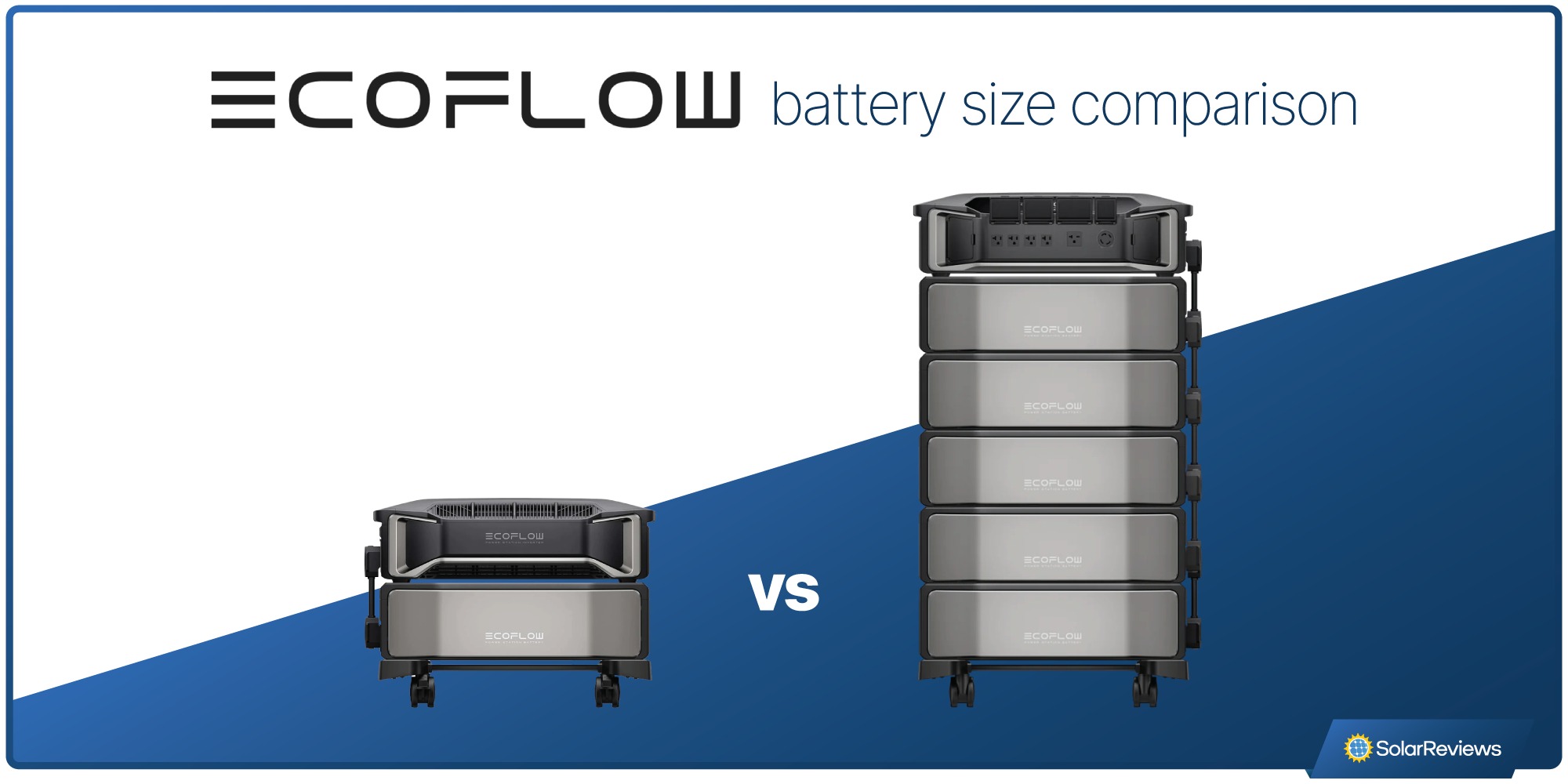
A battery’s capacity describes how much electricity the battery can store. The higher the battery’s capacity, the longer the battery can power your home or devices. The DPU has a capacity of 6.1 kWh for one battery, but it can be expanded up to 30 kWh per inverter. If you choose to expand up to its maximum capacity, you can install up to three units to reach the 90 kWh.
According to data from the U.S. Energy Information Administration (EIA), the average home uses 30 kWh per day, meaning most homeowners would probably be able to fully run their home for a full day when paired with solar and a two-battery DPU unit. However, if you expand the DPU to its full 90 kWh capacity, you could have the capability to fully power your home for a few days at a time.
Most homes don’t need this much storage, but it can come in handy for any off-grid living spaces, or if you live in an area that experiences extended power outages.
Warranty
EcoFlow provides a five-year warranty for the DELTA Pro Ultra batteries, much lower than the industry standard storage warranty of ten years.
We haven’t seen a full warranty document for the DPU batteries, so we can’t say if there is any sort of production guarantee at the end of the warranty term. EcoFlow does say that the battery has a 3,500 cycle life before being reduced to about 80% capacity, but it’s unclear if this is part covered by the official warranty, or just an estimate of how you can expect the battery to perform over time.
Battery chemistry
Lithium iron phosphate (LFP) batteries have quickly become the industry standard for most solar and home storage devices. This is mainly due to the fact that it can withstand higher temperatures and it doesn’t contain any toxic metals.
This type of battery lasts longer, has better safety ratings, and has a good value. Devices that use LFP batteries typically have a slightly higher upfront cost, but it’s worth having a safer battery that still performs well.
Power output
The power output of a battery is a measure of how much a battery can release, and gives you an idea of what appliances it can run. In this case, the DPU can power up to 7.2 kW of power with a single battery and inverter unit. The typical power output for batteries range from 5 kW to 7 kW, so surpasses the industry standard with just a single unit.
According to EcoFlow, this is enough to power a three-ton central air conditioner. That can come in handy during hot summer months!
If you expand your system to its maximum capacity, you’ll reach up to 21.6 kW of power output.
Solar Input
The DPU comes with connections for low and high-PV technologies. This battery can connect with flexible, plug-and-play types of solar panels, and new or existing rooftop solar.
A connection with a single EcoFlow inverter can handle up to 5.6 kW of solar input. That increases to 16.8 kW when you max out the capacity by installing three separate units.
Experiencing a prolonged power outage? Pairing your DPU with solar panels can help you ensure power for longer, using the power of the sun!
Don’t have solar panels? Don’t worry! If your DELTA Pro Ultra runs out of power during a blackout, you have the capability to connect the battery with a gas generator to keep your appliances running.
Bonus features
The DELTA Pro Ultra home battery is Wi-Fi and Bluetooth-supported. The front of the battery features a large screen that tells you what percentage of battery life is left, with a timestamp underneath of how long your battery is estimated to last. The screen also tells you (in watts) the amount of input and output power the battery is receiving and releasing.
For all of the output ports, the six AC outlets combined have 7200 W of output power, the two USB-A ports total 24 W, the two USB-C ports total 200 W, and the single DC output outlet maxes out at 378 W.
EcoFlow app
The DELTA Pro Ultra battery can be controlled and tracked right at your fingertips by using the EcoFlow app. When using the app, you have access to everything, like the battery life and the input and output wattage. You can even control breakers right from your phone if your system is paired with the EcoFlow Smart Home Panel 2. The user-friendly interface provides a personalized and connected experience with your battery.
The app has other great features in its settings menu, such as a device-sharing option, energy management features, vehicle input selections, and much more!
How does the EcoFlow DELTA Pro Ultra compare to other brands?
The chart below shows how the DPU stacks up against the Tesla Powerwall and the Enphase IQ battery – two popular choices among customers and installers. Please note that the prices listed include the costs of the battery and the necessary equipment for home installation.
Feature | DELTA Pro Ultra | Tesla Powerwall 3 | Enphase IQ 5P |
|---|---|---|---|
Cost* | $6,198 | $9,200 | $6,008 |
Warranty | 5 years | 10 years | 15 years |
Capacity | 6.1 kWh | 13.5 kWh | 5 kWh |
Power output | 7.2 kW | 11.5 kW | 3.84 kW |
Expandable | Yes | Yes, double size only | Yes |
*not including installation costs or incentives
Where the DPU really shines is with its power output and expandability options. The DPU’s power output surpasses its runner-up, the Tesla Powerwall, by almost 2 kW despite being half the size.
In terms of expandability, you have more control over the size of the DPU because the batteries can be stacked like a tower, making it a little more compact compared to Enphase’s design. The Tesla Powerwall 2 is only limited to double its size, whereas the DPU can expand far beyond that.
Where the DPU falls short in comparison to these batteries is with its warranty coverage, having five years of coverage against the ten and fifteen years that Tesla and Enphase offer, respectively.
When you break down the cost per kilowatt-hour of storage of these batteries, Tesla wins by a long shot. The Tesla Powerwall costs about $681 per kWh of storage capacity, whereas the Delta Pro Ultra comes in at $1,016 per kWh. The DELTA Pro Ultra is cheaper than Enphase’s option.
What are some uses for the EcoFlow Pro Ultra?
Like we mentioned before, this battery is meant to be interchangeable. You have the freedom to take this thing on the go or (when paired with a smart panel) have backup and daily use power capabilities. With all of the features this battery has to offer, there’s a variety of uses for it – such as:
Back-up power during a blackout: Keep your most energy-hungry appliances running in the event of a power outage. If you experience a prolonged power outage, this battery can connect to a gas generator or solar panels to ensure power for longer.
Electricity bill savings: If you live somewhere with time of use utility rates, the EcoFlow Smart Panel lets you charge when electricity rates are low and discharge when rates are high, letting you save some extra money on your bills!
Off-grid power needs: Going camping? Don’t have access to the power grid? This battery can power any device you might need in an off-grid scenario.
EV charging outlet: Charge your electric vehicle right from your battery using the outlet provided. Better yet, you can even charge your battery using an EV charging station, just to add to the multiple other options you have to charge your battery.
Final thoughts
The DELTA Pro Ultra is a good option for those looking for backup power to run a few essential appliances or for those looking to run an off-grid cabin. We are concerned about the warranty coverage, as it’s half of what its competitors offer.
We highly recommend pairing this battery with a Smart Home Panel 2 for the best benefits. Also, its portability has great uses for vacations and camping trips, giving you the ability to power virtually any device you need, anywhere.
Overall, the DELTA Pro Ultra is worth considering, just be mindful of the warranty and that you may have an easier time getting batteries right from your solar installer. To find the best solar battery for your home, you should get multiple installation quotes. Not only will this let you find the right battery, but it’ll help you get the best installation price, as well.
Jamie is a Content Writer and researcher at SolarReviews. A recent graduate of La Salle University in Philadelphia, Jamie earned her B.S. in communications with a concentration in journalism, mass media, and public relations. Jamie has previously worked at a marketing company where she had the opportunity to highlight and promote small business owners through long-form stories and interviews. With a deep-rooted passion for creativity, Jamie stri...
Learn more about Jamie Smith